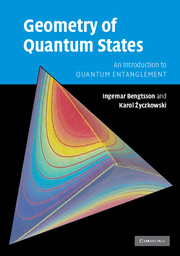Book contents
- Frontmatter
- Contents
- Preface
- 1 Convexity, colours and statistics
- 2 Geometry of probability distributions
- 3 Much ado about spheres
- 4 Complex projective spaces
- 5 Outline of quantum mechanics
- 6 Coherent states and group actions
- 7 The stellar representation
- 8 The space of density matrices
- 9 Purification of mixed quantum states
- 10 Quantum operations
- 11 Duality: maps versus states
- 12 Density matrices and entropies
- 13 Distinguishability measures
- 14 Monotone metrics and measures
- 15 Quantum entanglement
- Epilogue
- Appendix 1 Basic notions of differential geometry
- Appendix 2 Basic notions of group theory
- Appendix 3 Geometry: do it yourself
- Appendix 4 Hints and answers to the exercises
- References
- Index
11 - Duality: maps versus states
Published online by Cambridge University Press: 27 August 2009
- Frontmatter
- Contents
- Preface
- 1 Convexity, colours and statistics
- 2 Geometry of probability distributions
- 3 Much ado about spheres
- 4 Complex projective spaces
- 5 Outline of quantum mechanics
- 6 Coherent states and group actions
- 7 The stellar representation
- 8 The space of density matrices
- 9 Purification of mixed quantum states
- 10 Quantum operations
- 11 Duality: maps versus states
- 12 Density matrices and entropies
- 13 Distinguishability measures
- 14 Monotone metrics and measures
- 15 Quantum entanglement
- Epilogue
- Appendix 1 Basic notions of differential geometry
- Appendix 2 Basic notions of group theory
- Appendix 3 Geometry: do it yourself
- Appendix 4 Hints and answers to the exercises
- References
- Index
Summary
Good mathematicians see analogies. Great mathematicians see analogies between analogies.
Stefan BanachWe have already discussed the static structure of our ‘Quantum Town’ – the set of density matrices – on the one hand, and the set of all physically realizable processes which may occur in it on the other hand. Now we are going to reveal a quite remarkable property: the set of all possible ways to travel in the ‘Quantum Town’ is equivalent to a ‘Quantum Country’ – an appropriately magnified copy of the initial ‘Quantum Town’! More precisely, the set of all transformations which map the set of density matrices of size N into itself (dynamics) is identical to a subset of the set of density matrices of size N2 (kinematics). From a mathematical point of view this relation is based on the Jamiołkowski isomorphism, analysed later in this chapter. Before discussing this intriguing duality, let us leave the friendly set of quantum operations and pay a short visit to a neighbouring land of maps, as yet unexplored, which are positive but not completely positive.
Positive and decomposable maps
Quantum transformations which describe physical processes are represented by completely positive (CP) maps. Why should we care about maps which are not CP? On the one hand it is instructive to realize that seemingly innocent transformations are not CP, and thus do not correspond to any physical process. On the other hand, as discussed in Chapter 15, positive but not completely positive maps provide a crucial tool in the investigation of quantum entanglement.
Information
- Type
- Chapter
- Information
- Geometry of Quantum StatesAn Introduction to Quantum Entanglement, pp. 281 - 296Publisher: Cambridge University PressPrint publication year: 2006
